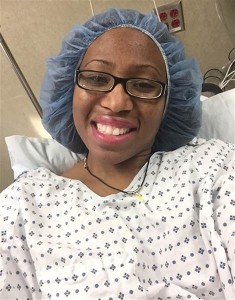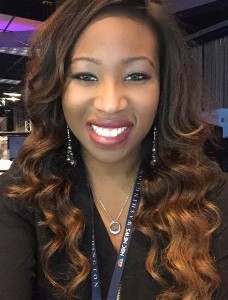‘Pain’ and ‘uncertainty’: A young woman shares her struggle with endometriosis
Mar. 4, 2016 at 12:36 PM
Chandelis Duster
TODAY
Endometriosis, the word itself sounds like an incurable disease, and unfortunately that’s true.
I should know. I have it.
Endometriosis — or “endo” — occurs when cells that line the uterus spread to other places of the body creating implants and adhesions, or internal scar tissue. These implants can end up on the bladder, ovaries, bowels, and can even spread to the lungs.
Endo’s symptoms
The disease’s symptoms include painful bowel movements, pelvic pain, lower back pain, and the most common symptom — painful periods. When actress Lena Dunham announced that endo would prevent her from joining the promotional press tour for the fifth season of her hit HBO show “Girls,” I could relate.
As could many other women. The Endometriosis Foundation of American says endo affects 176 million women and young girls worldwide, 8 million of them in North America.
My endo story began at age 9 when I had my first period. I’ve had painful periods my entire life and missed many days of school because of them. I’ve even fainted a few times from the pain. My periods were heavy, lasting from 7-10 days. In high school, my mom sensed something was wrong and took me to a gynecologist.
The doctor told me my pain was normal, and at 16, I was put on birth control to regulate my periods. I was given Naproxen for pain and told to take an iron supplement because I was anemic.
A diagnosis — at last
It wasn’t until my freshman year in college that I discovered endo was the culprit. At the campus health clinic a cyst the size of a grapefruit was found on my ovary.
On February 27, 2007 — a date I’ll never forget — I had laparoscopic surgery to drain the cyst. When I woke up, the doctor told me everything had gone well, but they’d also found endo in my cul-de-sac, or the back of the uterus.
I remember saying, “Endo what?”
At 18, my world was shattered. I had a disease with no cure. I felt like a freak. I was embarrassed.
I had a thousand questions: What is going to happen next? Is this going to spread? Why me?
Not to mention how long I’d suffered. The Endometriosis Foundation of America says there is an average of six to 10 years of delay in diagnosis. Laparoscopy is the only way to correctly diagnose it. It can’t be detected through an ultrasound or CT scan.
Though endo’s cause is unknown, the retrograde menstruation theory suggests that endometrial cells flow back into the fallopian tube, causing growths.
My life today
Today, I’m 27 and still dealing with endo and the symptoms that come along with it. I’ve been on several treatments and all of them have been a mixed bag. Prescription pain medications such as Percocet make my stomach hurt. I was on six months of Lupron, which makes a woman menopausal during her time on it. I’ve also had three laparoscopic surgeries.

Chandelis before her third surgery in December 2014. “I was trying to ‘brave the storm’ of another surgery so I took a selfie.”
I had my last surgery in December 2014 while in graduate school earning a M.A. in Broadcast Journalism and Public Affairs from American University. During the procedure, endo was found again — this time on both sides of my pelvic wall and again in the cul-de-sac. Prior to that surgery, my pain was so severe that simple things like sitting in a chair became a challenge. It felt as if someone was pulling my pelvic area apart and sticking a knife in my lower back all at the same time.
A year later, I’m feeling better, but I still have flare-ups. My lower back pain is intense, so I sleep with a heating pad every night for relief. My current treatment is taking a low-estrogen birth control pill continuously without having a monthly period. Doctors believe this is the best option if I want to preserve my fertility and not have hysterectomy.
Yes, endo is also known to cause infertility. I’m terrified I will be one of the women who will experience it.
I’m not sure that this treatment or any treatment will prevent endo from spreading because no matter what, mine keeps coming back.
Until a cure is found, there’s always that uncertainty, that nagging pain, the medications, and the possibility of a fourth surgery some day.
As tired as I am of endo’s terrible spin cycle, all I can do is sleep with the heating pad every night, take my Vitamin B12 pills for energy, hope for the best and keep going.
Chandelis Duster is a Desk Assistant in the NBC News Washington D.C. bureau and the co-founder of Virginia HOPE, an organization that helps women in Virginia who have endometriosis.

Related Articles
No user responded in this post